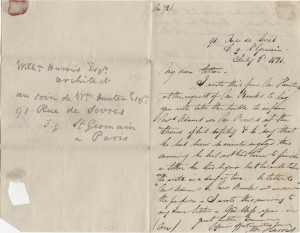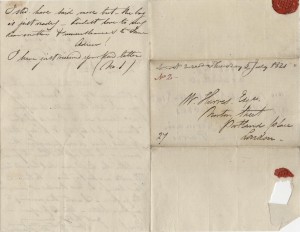It’s been a while since I updated you about William Harris Esq.’s continental exploits in 1821. As you may remember, he set out from Dover after having explored the castle and travelled to Calais in the company of two friends in June. I’m sure you’ll be pleased to know that he had arrived safely at Paris by the beginning of July.
William and his friend Mr Brooks were staying at a William Hunter’s residence on rue de Sevres, in the St Germain district of the city. William Harris wrote to his father on 2 July to ask that his father might ‘inform Mrs. Adams and Mrs. Brooks of the Strand’ of Mr. Brook’s safe arrival. William added
“[Mr Brooks] had been so much engaged this morning he has not had time to finish a letter he had begun but he will take care to write in a day or two”
It seems that William was the more likely of the two to write home; in any case, a swift letter was the speediest method of communication in 1821. William comments on the end of his note that he had just received his father’s “kind letter (no. 1)”: this leaves a gap of just 8 days between his sending from Calais and receiving his father’s reply. I have to say I thought this wasn’t bad by modern standards!
Paris in 1821 was still gripped by the instability of the political swings from the Napoleonic, in 1815, to the accession of Louis-Phillippe as king in 1830. During this time, Britain had formed part of a European coalition which restored the Bourbon monarchy, by military force, to a constitutional role. The monarchy was not consistently popular and after the second fall of Napoleon at Waterloo in 1815; although the government was elected to work alongside the Bourbons the two institutions did not always work together. Shifting political strengths throughout the decade of the 1820s must have made Paris an interesting place to be. The medieval city was still largely in existence, too; it was not demolished to make way for Haussmann’s vision of a modern city until the mid nineteenth century. It would have been a very different place to the modern tourist centre.
Of course, travel in the nineteenth century was never a straightforward or safe affair, as we’ll find out later in William’s journey. But for the time being, I will leave you with his brief note, in anticipation of the Parisian adventure to follow.
“I would have said more but the boy is just ready.”
Drop into the Templeman foyer to have a look at the original letter on display with a rare example of a nineteenth century passport.


